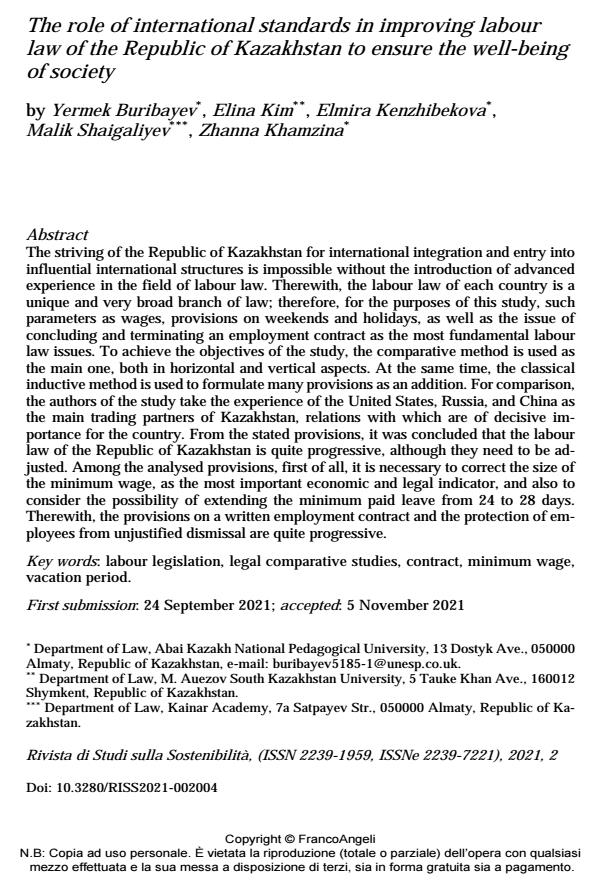The role of international standards in improving labour law of the Republic of Kazakhstan to ensure the well-being of society
Journal title RIVISTA DI STUDI SULLA SOSTENIBILITA'
Author/s Yermek Buribayev, Elina Kim, Elmira Kenzhibekova, Malik Shaigaliyev
Publishing Year 2022 Issue 2021/2
Language English Pages 15 P. 33-47 File size 111 KB
DOI 10.3280/RISS2021-002004
DOI is like a bar code for intellectual property: to have more infomation
click here
Below, you can see the article first page
If you want to buy this article in PDF format, you can do it, following the instructions to buy download credits

FrancoAngeli is member of Publishers International Linking Association, Inc (PILA), a not-for-profit association which run the CrossRef service enabling links to and from online scholarly content.
The striving of the Republic of Kazakhstan for international integration and entry into influential international structures is impossible without the introduction of advanced experience in the field of labour law. Therewith, the labour law of each country is a unique and very broad branch of law; therefore, for the purposes of this study, such parameters as wages, provisions on weekends and holidays, as well as the issue of concluding and terminating an employment contract as the most fundamental labour law issues. To achieve the objectives of the study, the comparative method is used as the main one, both in horizontal and vertical as-pects. At the same time, the classical inductive method is used to formulate many provisions as an addition. For comparison, the authors of the study take the expe-rience of the United States, Russia, and China as the main trading partners of Ka-zakhstan, relations with which are of decisive importance for the country. From the stated provisions, it was concluded that the labour law of the Republic of Ka-zakhstan is quite progressive, although they need to be adjusted. Among the ana-lysed provisions, first of all, it is necessary to correct the size of the minimum wage, as the most important economic and legal indicator, and also to consider the pos-sibility of extending the minimum paid leave from 24 to 28 days. Therewith, the provisions on a written employment contract and the protection of employees from unjustified dismissal are quite progressive.
Keywords: labour legislation, legal comparative studies, contract, minimum wage, vacation period.
- Stigma as a major barrier to human rights in health-care assessment: evaluating the psychometric properties of the substance use stigma mechanism scale Mahvia Gull, Muhammad Aqeel, Aniqa Kanwal, in International Journal of Human Rights in Healthcare /2025 pp.207
DOI: 10.1108/IJHRH-01-2025-0001
Yermek Buribayev, Elina Kim, Elmira Kenzhibekova, Malik Shaigaliyev, The role of international standards in improving labour law of the Republic of Kazakhstan to ensure the well-being of society in "RIVISTA DI STUDI SULLA SOSTENIBILITA'" 2/2021, pp 33-47, DOI: 10.3280/RISS2021-002004